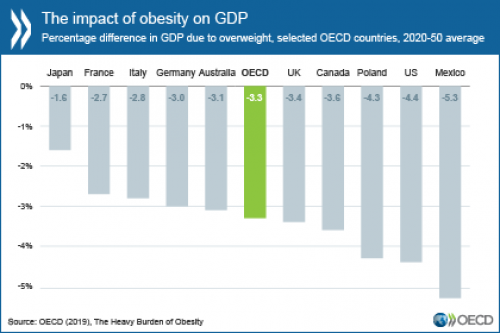Tackling obesity would boost economic and social well-being
Obesity-related diseases will claim more than 90 million lives in OECD countries in the next 30 years, with life expectancy reduced by nearly 3 years. Obesity and its related conditions also reduce GDP by 3.3% in OECD countries and exact a heavy toll on personal budgets, amounting to USD 360 per capita per year, according to a new OECD report.

The OECD’s The Heavy Burden of Obesity – The Economics of Prevention says that more than half the population is now overweight in 34 out of 36 OECD countries and almost one in four people is obese. Average rates of adult obesity in OECD countries have increased from 21% in 2010 to 24% in 2016, meaning an additional 50 million people are now obese.
Children in particular are paying a high price for obesity. Children who are overweight do less well at school, are more likely to miss school, and, when they grow up, are less likely to complete higher education. They also show lower life satisfaction and are up to three times more likely to be bullied, which in turn may contribute to lower school performance.
Obese adults are at greater risk of chronic illnesses, such as diabetes, and reduced life expectancy. In the EU28, women and men in the lowest income group are, respectively, 90% and 50% more likely to be obese, compared to those on the highest incomes, entrenching inequality. Individuals with at least one chronic disease associated with being overweight are 8% less likely to be employed the following year. When they have a job, they are up to 3.4% more likely to be absent or less productive.
“There is an urgent economic and social case to scale up investments to tackle obesity and promote healthy lifestyles,” said OECD Secretary-General Angel Gurría. “These findings clearly illustrate the need for better social, health and education policies that lead to better lives. By investing in prevention, policymakers can halt the rise in obesity for future generations, and benefit economies. There is no more excuse for inaction.”
OECD countries already spend 8.4% of their total health budget on treating obesity-related diseases. This is equivalent to about USD 311 billion or USD 209 per capita per year. Obesity is responsible for 70% of all treatment costs for diabetes, 23% for cardiovascular diseases and 9% for cancers.
New OECD analysis in the report finds that investing in initiatives like better labelling of food in shops or regulating the advertising of unhealthy foods to children can generate major savings. Every dollar invested in preventing obesity would generate an economic return of up to six dollars, according to the report.
Reducing by 20% the calorie content in energy-dense food, such as crisps and confectionery, could avoid more than 1 million cases of chronic disease per year, particularly heart disease. Initiatives targeting the whole population, such as food and menus displaying nutritional information and mass media campaigns, could lead to gains of between 51,000 to 115,000 life years per year up to 2050 in the 36 countries included in the analysis. This would be equivalent to preventing all road deaths in EU28 and OECD countries respectively. Economic savings would also be significant, with menu labelling alone saving up to USD 13 billion between 2020 and 2050.
Source: Organisation for Economic Co-operation and Development
- 344 reads
Human Rights
Fostering a More Humane World: The 28th Eurasian Economic Summi

Conscience, Hope, and Action: Keys to Global Peace and Sustainability

Ringing FOWPAL’s Peace Bell for the World:Nobel Peace Prize Laureates’ Visions and Actions

Protecting the World’s Cultural Diversity for a Sustainable Future

Puppet Show I International Friendship Day 2020

